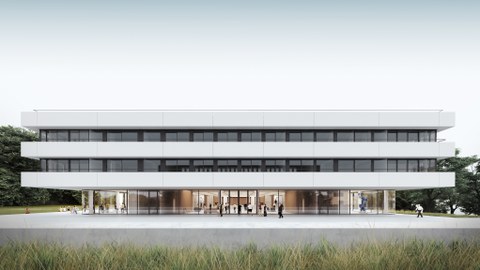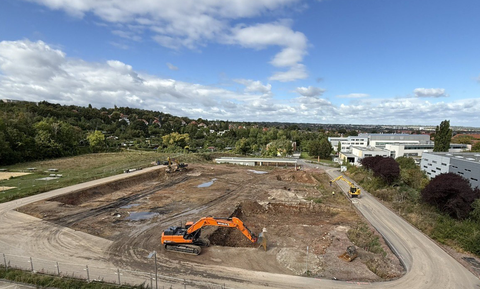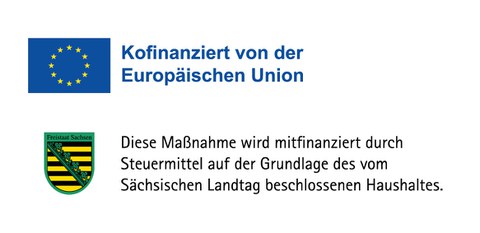24.09.2025
Baubeginn für das neue Lehmann-Zentrum: Mehr Raum für die digitale Transformation
Südlich der Nöthnitzer Straße haben die Bauarbeiten für das Lehmann-Zentrum-Bürogebäude (LZB) begonnen. In unmittelbarer Nachbarschaft zur Fakultät Informatik, dem Rechenzentrum der Technischen Universität Dresden (TUD) und dem gerade bezogenen DLR-Institut für Softwareentwicklung entsteht ein zentraler Ort für digitale Wissenschaften an der TUD. Das fünfgeschossige Gebäude bietet als neues Zuhause des Center for Interdisciplinary Digital Sciences (CIDS) Platz für über 600 Mitarbeitende aus acht Departments – den zentralen Dienstleistungs- sowie den verbundenen Forschungseinheiten. Gemeinsam arbeiten sie an den zentralen Fragestellungen der digitalen Transformation. Im LZB bündeln sich die Kompetenzen des CIDS zur digitalen Transformation – von der Spitzenforschung und direkten Anwendungen bis zu zentralen Services und Infrastrukturen, die Forschende aus allen Fachrichtungen unterstützen.
Der Baubeginn markiert einen wichtigen Schritt sowohl für die bauliche als auch für die strategische Weiterentwicklung des TUD-Campus in den Bereichen digitale Forschung, Künstliche Intelligenz, Hochleistungsrechnen und gesellschaftliche Transformation. Die Fertigstellung des Gebäudes ist für Ende 2029 geplant. Der Bau wird aus Mitteln des Europäischen Fonds für regionale Entwicklung (EFRE) kofinanziert. Die Grundsteinlegung ist für das Frühjahr 2026 vorgesehen.
„Als Kristallisationspunkt digitaler Wissenschaften vernetzt das CIDS alle Fakultäten, öffnet Türen für Kooperationen und gibt Impulse in alle Richtungen. Forschung, Infrastruktur und Services verbinden sich hier zu einem Zentrum, das neue Methoden und Technologien entwickelt, erprobt und in Anwendung und Gesellschaft trägt“, sagt Prof. Wolfgang E. Nagel, Gründungsdirektor des CIDS.
Ein Zentrum – zwei Häuser: Starkes Netzwerk digitaler Spitzenforschung
Das neue Lehmann-Zentrum-Bürogebäude (LZB) ergänzt das bereits 2015 eröffnete Lehmann-Zentrum-Rechenzentrum (LZR) um den Raum für Menschen, Ideen und Zusammenarbeit. Während das LZR die Hochleistungsrechner und die zentralen Server- und Speichersysteme der TUD sowie weiterer Forschungseinrichtungen beherbergt, bringt das LZB die Köpfe zusammen – Forschende, Entwicklerinnen und Entwickler, Service-Teams sowie Partnerinnen und Partner aus Wissenschaft, Wirtschaft und Politik.
In unmittelbarer Nähe zur Fakultät Informatik und dem Exzellenzcluster CeTI (Zentrum für taktiles Internet mit Mensch-Maschine-Interaktion) der TUD entsteht so ein Netzwerk, das Spitzenforschung im Bereich digitaler Infrastrukturen und anwendungsorientierter Entwicklung verbindet. Diese räumliche und inhaltliche Nähe ist ein entscheidender Erfolgsfaktor für die interdisziplinäre Forschung und zahlt direkt auf die Innovations- und Digitalisierungsstrategie des Freistaates Sachsen ein.
New-Work-Konzept soll Innovation fördern – Ausstellungen geplant
Das LZB ist konzipiert als offener Ort für Vernetzung, Austausch und gemeinsames Arbeiten – von der täglichen Zusammenarbeit in modernen „New Work“-Bereichen bis hin zu internationalen Konferenzen und Reallaboren. Architektur und Raumkonzept machen den interdisziplinären Ansatz des CIDS erlebbar. Die offene Struktur mit fünf Geschossen, einem zentralen Hörsaal sowie Begegnungsflächen und zwei Foyers fördern Austausch, Inspiration und Innovation. Sichtbar soll die Forschung das Hauses insbesondere in Form einer permanenten, modularen Ausstellung im Hauptfoyer werden. Entwickelt durch das Interactive Science Lab des CIDS unter dem Titel //DataSpaces, werden hier Einblicke in die Arbeit der CIDS-Departments und ihrer Partner gegeben, die auch jetzt bereits in Ausstellungsformaten u. a. im COSMO Wissenschaftsforum im Kulturpalast erlebbar sind.
Wichtiger Beitrag zur Exzellenzstrategie
Das CIDS spielt als interdisziplinäres Zentrum eine wichtige Rolle in der Exzellenzstrategie der TUD. Unter dem Leitgedanken, dass Digitalisierung ein Schlüsselfaktor für institutionelle Erneuerung und Zukunftsfähigkeit ist, fördert und unterstützt es Digitalisierungsprozesse in allen Leistungsbereichen der Universität. Als wissenschaftlicher und Infrastruktureller Knoten treibt das CIDS die Entwicklung und den Einsatz u. a. von Künstlicher Intelligenz voran. So entstehen neue Formen der Zusammenarbeit, mehr Effizienz in den Abläufen und neue Chancen für alle Mitglieder der TUD, digitale Technologien aktiv zu gestalten.
Kontakt
Jacqueline Papperitz
Projektkoordination/Öffentlichkeitsarbeit
Center for Interdisciplinary Digital Sciences (CIDS)
Tel.: +49 351 463 32431
E-Mail:



